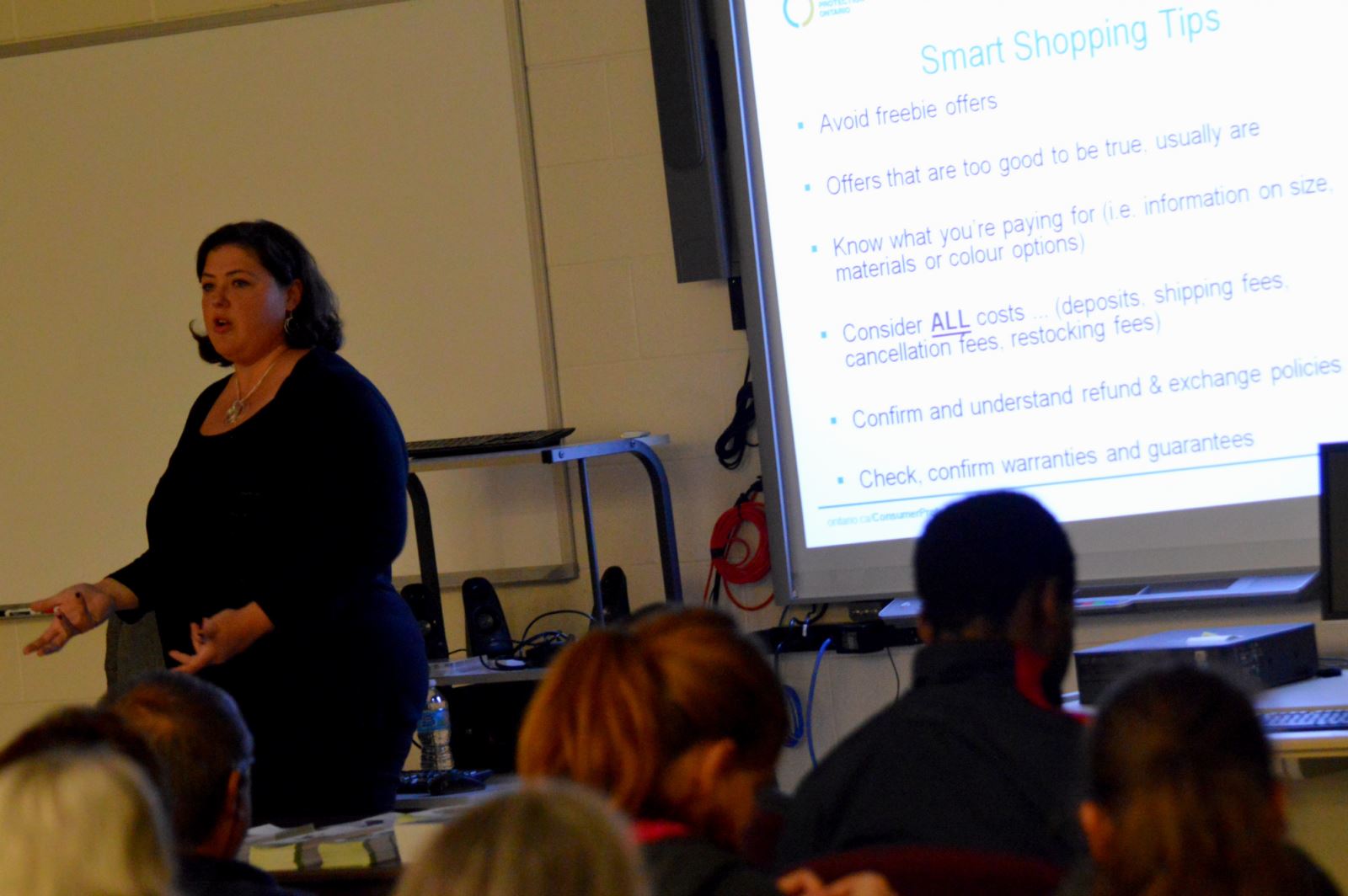 Michelle Falone, public education advisor for Consumer Protection Ontario, hosts a free Consumer Education Workshop at police headquarters on Tuesday afternoon. Falone helped identify common scams and explained how people can prevent falling victim to them. PHOTO BY LIAM BERTI
Michelle Falone, public education advisor for Consumer Protection Ontario, hosts a free Consumer Education Workshop at police headquarters on Tuesday afternoon. Falone helped identify common scams and explained how people can prevent falling victim to them. PHOTO BY LIAM BERTI
When a complete stranger told North Bay resident Elizabeth Dunne that her house needed a drastic and expensive overhaul to eliminate mould, she knew something wasn’t quite right.
The stranger appeared unannounced at Dunne’s door representing a company that she had never done business with nor heard of before. The intrusive company representative manipulated Dunne into showing her around the house, at which time she set up a “test” that showed extreme levels of mould.
Dunne thought her house was in excellent form, yet here she was being told from an “expert” how dire the situation in her home was.
After seeking advice from the people she normally does business with, Dunne found out that her house was mould-free and in top working order.
But while Dunne knew better than to trust the stranger’s word, many others fall victim to camouflaged scams and don’t find out until it’s too late.
That’s why Michelle Falone, public education advisor for Consumer Protection Ontario, held a free Consumer Education Workshop at North Bay Police Service Headquarters on Tuesday afternoon.
Falone, a trained mediator and experienced resolver of consumer disputes, tours the province to inform the public about their rights and responsibilities.
She used a plethora of anecdotal evidence to help those in attendance realize the significant threats that are out there every day. Many gasps and exclamations filled the police station’s lower lecture room as the nearly 70 people in attendance learned how to better protect themselves as consumers.
“Scammers target everybody,” said Falone, who has been with the ministry for over 10 years. “If you’re home to answer the phone, you’re a target. They’re not interested in a certain demographic, they’re interested in access to people in general.”
Falone covered identity theft, door-to-door sales scams, telemarketing scams, emergency scams, romance scams, email and Internet scams, and everything else in between. Often times, she said, the criminals will prey on the emotions and feelings of the victims, making them feel pressured or afraid.
From there, she offered advice on how to spot a scam from the beginning and how to avoid being pulled in by the manipulative tactics.
“I love to take the stories that I hear and re-use them because I really think it makes a difference when people know that they’re not the only ones affected by this,” said Falone.
“There is no rhyme or reason to how you get targeted, but the anecdotes help,” said Falone. “People can relate to them and they can see how they might potentially get caught.”
Many of those in attendance were senior citizens, a demographic that North Bay Police Chief Paul Cook said tend to be more vulnerable to modern scam systems.
“Back in the day, people closed land deals and sold houses on a hand shake, so senior citizens have a tendency to be very trusting,” said Cook. “Some of these scam artists are very good at what they do and, unfortunately with technology, it becomes an opportunity for people that are involved in the criminal element to apply their trade.
“Like any other community, fraud, scams and identity theft is a significant issue in North Bay,” Cook continued.
As far as basic steps that everyone should be doing to protect themselves, Falone says the most essential precautions are grounding yourself in as much research as possible about common consumer scams.
“First and foremost, it’s all about research,” said Falone. “Also, making sure that you find and use reputable companies and that involves talking to friends, family and using your networks.
“Also, making sure that the people you are contacting have a proper, physical address that you can reach,” she continued. “It’s all about research and making sure you have everything in writing, in as much detail as possible.”
Consumer Protection Ontario is a an awareness program under the province’s Ministry of Government and Consumer Services to promote consumer rights and public safety.
For more information, Falone strongly recommends checking out the Consumer Protection Ontario website: www.ontario.ca/consumperprotection


